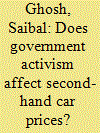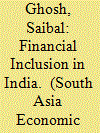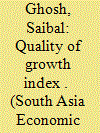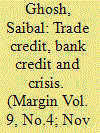| Srl | Item |
| 1 |
ID:
157666


|
|
|
|
|
| Summary/Abstract |
A significant body of literature has focused on the impact of policy changes on consumption behaviour. Most of this literature looks at the impact of anticipated and durable changes, thereby ignoring the impact of unanticipated changes. In this context, exploiting a unique data set for India, the article examines the impact of a temporary ‘odd–even’ policy experiment in Delhi on second-hand car prices. The findings suggest that car prices on average, declined by 2.7 per cent after the policy announcement, although these prices subsequently recouped the initial losses. A disaggregation of car prices in terms of costs indicates that these results are driven by low-priced cars and, additionally, that cars with odd-number ending registrations commanded a premium in the market.
|
|
|
|
|
|
|
|
|
|
|
|
|
|
|
|
| 2 |
ID:
175349


|
|
|
|
|
| Summary/Abstract |
Employing a novel district-level survey data for India, the study investigates the impact of distance on financial inclusion. Using advanced econometric techniques, the findings indicate that distance primarily dampens the use of bank accounts as compared with access. These results are robust irrespective of whether distance is measured in terms of the time taken to reach the banking infrastructure or physical distance. These results are robust to a wide battery of robustness checks. The analysis suggests the need for policy strategies that can address the tyranny of distance towards achieving the financial inclusion goal.
|
|
|
|
|
|
|
|
|
|
|
|
|
|
|
|
| 3 |
ID:
143532


|
|
|
|
|
| Summary/Abstract |
Employing decadal data for the period 1971–2011, this article constructs a quality of growth index (QGI) for major Indian states. The index encompasses not only growth and its durability, but also encompasses several relevant social dimensions. These include variables such as stability and diversification of growth as well as institutional quality and social indicators such as life expectancy and literacy rate. The extended period chosen enables us to trace the evolution of the index over a sufficiently long period of time. Several findings stand out. First, the average value of the index is higher in the post-reform period, suggesting that there has been an overall improvement in the quality of growth over time. However, although the BIMAROU states have raised their QGI, they have still lagged behind their peers. Second, it is typically the industrialized states which have witnessed higher QGI. And third, the industrialized states, with improved financial access and better physical infrastructure, which are better placed are those with higher QGI.
|
|
|
|
|
|
|
|
|
|
|
|
|
|
|
|
| 4 |
ID:
142015


|
|
|
|
|
| Summary/Abstract |
Employing data on an extended sample of manufacturing firms during 1993–2012, the article studies the inter-linkage between trade credit and bank credit and how it evolved during the crisis. Accordingly, we first discuss the relevance of a trade-credit channel in India and subsequently, explore the interplay between these two financing forms. The analysis provides some evidence in favour of a trade-credit channel in India. More importantly, the findings indicate that bank credit and trade credit are complementary, although there was a differential impact on accounts payable (demand) and accounts receivables (supply) during the crisis.
|
|
|
|
|
|
|
|
|
|
|
|
|
|
|
|